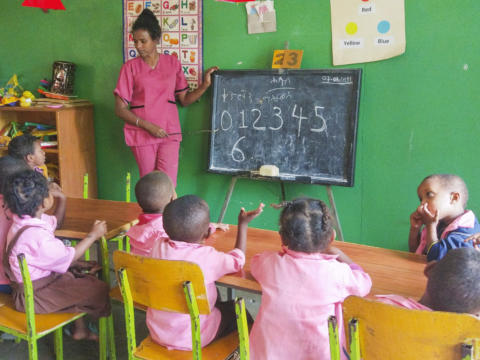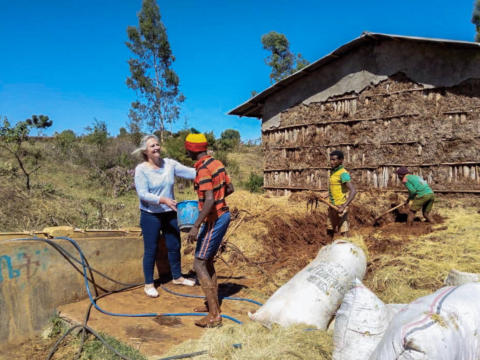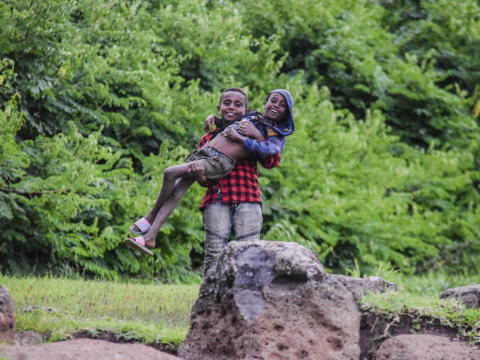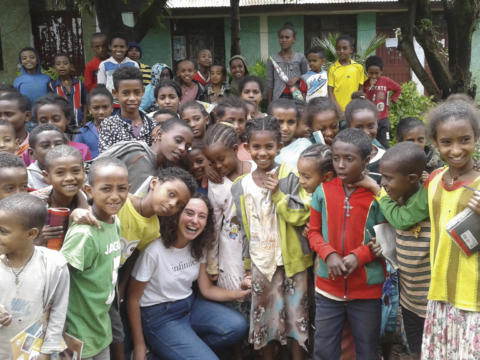Only 360€ per week!
Kindergarten
Bahir Dar - Ethiopia
Take this opportunity to teach Kindergarten kids. You could do it with the help of building blocks and helping them in the recognition of colours, shapes and objects.
Start them off on alphabets and numbers. As is with small children, they can imbibe inputs for a maximum of 30 – 40 minutes only at a stretch. This being their formative years, there should be scope for learning through fun and games which helps them concentrate. This could be challenging but we assure you, is extremely rewarding.
Program Description
Being kindergarten kids, they are playful and exuberant. These years, 4 to 7, are also very important in a child’s growth. You would be spending your valuable time and effort in the early and most important education of these children. The attention span of kids as is known is very short. Keeping this in mind, a self-directed activity approach, hands-on learning and collaborative play way method of learning are advised.
You could put to good use your creative skills and come up with interesting ways to keep the children focussed and help them learn alphabets and numbers. Recognising shapes, colours, fruits, vegetables and animals. Mind you, not how much is learnt is important, but that the children come to enjoy the activity itself and thus the spirit of learning is imbibed in them at this early phase in their life is important.
Aims & Objectives
The children are from age 4 to 7 years. This is a critical age wherein participants can induce a positive outlook for their future by inducing a keen desire to learn.
Schedule
Monday to Friday
Having planned and prepared the lessons beforehand, you would be taking sessions of 30 to 40 minutes each. The children would be taught by the play-way method with simple alphanumeric exercises, getting to know shapes, colours, fruits, vegetables and animals. A lot of time outside the classroom is also recommended. This could be spent on teaching them some creative games and thus their energy is spent in a useful way. You will be teaching in slots from 9 am – 12 noon and 2 pm – 4 pm.
Note: This schedule can be changed and/or amended depending on weather conditions, local conditions and unforeseen circumstances.
Participant Criteria & Requirements
Standard Requirements
Minimum age: 18
Maximum age: 65
Minimum English level: Advanced
CRB required: On Signup
Passport copy required: On Signup
Resume copy required: No
Required qualification: None
Additional Requirements
- Yellow fever vaccination is mandatory for all participants arriving in Ethiopia.
- Due to the active nature of this program, a decent level of fitness is required.
- Participants below the age of 18 should have parental consent.
- Participants above the age of 65 should have medical clearance.
Additional Equipment
Dress Code
- Cover up as much as possible in the spirit of the local culture to avoid embarrassment.
- Your clothes must not be too short, too tight or too revealing. Kindly make sure your shoulders and legs are covered.
- Dress professionally since you will be working in a professional environment while teaching the children.
- It is completely fine to wear western clothes as long as they fit the local standards
- Be thoughtful of the graphics, symbols or text printed on your clothing and avoid wearing clothing styles that might be inappropriate
- Be thoughtful to poor communities by not displaying expensive items and clothes
- Wearing local clothes could help you build a good working relationship with the community
Location
Bahir Dar is a bustling city with palm tree and flower lined roads and is located in the Amhara region where Amharic is widely spoken. Lake Tana, a World Heritage Biosphere Reserve and the Blue Nile Falls are located nearby.
Daily flights connect Bahir Dar to Addis Ababa. Bus services from Addis Ababa to Bahir Dar entail a very comfortable bus journey of 10 hours rewarded with scenic views along the way.
Your accommodation is on the outskirts of Bahir Dar, about 3 to 4 kilometers from the projects, and is part of a gated community. The house overlooks Lake Tana and the Abyssinian Highlands.
About the Accommodation
Your center is located in the outskirts of the town, where you will be staying in a comfortable dorm-style accommodation for the duration of the project. The house is fully furnished, with laundry and store rooms. The center has a well-equipped kitchen. And there is also a cozy living room where you can hang out with the fellow participants and spend time.
Food Arrangements
Your meals will be mainly Ethiopian dishes. Vegetarian dishes will be available most of the days and non-vegetarian twice a week.
Facilities
Facilities include first aid equipment as well as coordinator support. Supermarkets, cafes, shops, ATMs are available nearby.
Activities & Events
No scheduled activities outside the program.
Sights & Surroundings
Your program will take place from Monday to Friday and weekends will be free for you to explore the city on your own. The places of interest and activities which you can visit during your free time include natural sites, town centers, museums, walking tours and many more. Some of the interesting sites are as follows;
- Blue Nile Falls
- The historic city of Gondar
- Simien Mountains National Park
- Tana Kirkos
Transportation
From this location we do not provide free transport to other locations.
Quick Facts
Name: Federal Democratic Republic of Ethiopia
Population: 102 million
Capital: Addis Ababa
Language: Amharic, English
Currency: Birr (ETB)
Time zone: CST (UTC +3)
Country Information
A country with a unique cultural heritage, the home of the Ethiopian Orthodox Church – one of the oldest Christian denominations – and a monarchy that ended only quite recently. Dating to prehistoric times and also having Biblical references, Ethiopia has a rich and varied history. Ethiopians pride themselves of never being colonized except for a five year period during Mussolini's occupation. Coupled with its beautiful highlands and desert it is a traveler’s delight. Addis Ababa the largest city and capital is like any other city with all its modern trappings. Culture, cuisine, wildlife, welcoming hospitality, these and many other experiences await you in this ancient and modern land. As Ethiopians like to say, "Come and enjoy, 13 months of sunshine!"
Climate
Predominantly of a tropical monsoon weather, but due to the Ethiopian Highlands which cover most of the country, Ethiopia experiences a climate which is generally considerably cooler than other regions at similar proximity to the Equator. Most of the country's major cities are located at elevations of around 6,500 to 8,000 feet above sea level.
Most major cities and tourist sites in Ethiopia lie at a similar elevation to Addis Ababa and have a comparable climate. In less elevated regions, particularly the lower lying Ethiopian xeric grasslands and shrublands in the east of the country, the climate can be significantly hotter and drier. Dallol, in the Danakil Depression in this eastern zone, has the world's highest average annual temperature of 34 °C (93.2 °F).
Culture
From Music and Dance to Attire and Customs, Ethiopia is unique in its own way. The blend of traditional and modern can be seen in its architecture to the way its people dress up and conduct their day to day lives. Steeped in religious roots its culture is as vibrant as any other modern countries’ but its traditions are always visible, never having been hidden or forgotten. The Ethiopian calendar is one of the most unique in the world today that is still being followed. It has 13 months, with 12 months of 30 days each. The last month has 5 days in a common year and 6 days during a leap year.
Gastronomy
Various vegetable and meat side dishes and entrees are the main of staples of Ethiopian cuisine, often prepared as a "Wat" or thick stew. One or more servings of wat are placed upon a piece of Injera, a large sourdough flatbread, which is about 20 inches in diameter and made out of fermented Teff flour. Injera is used, always with the right hand, to scoop up the entrees and side dishes. Pork or seafood, aside from fish, is not used, as most Ethiopians have historically adhered to Islam, the Ethiopian Orthodox Church, or Judaism, all of which prohibit the consumption of pork. Orthodox Christians observe numerous fasts, such as Lent, during which food is prepared without any meat or dairy products. Another dish served in Ethiopia is Doro Wat, which is a chicken stew with hard boiled eggs.
Transportation
Air
Air transport is easy and swift in Ethiopia with their national carrier, Ethiopian Airlines which operates across around 30 domestic cities and towns across the country.
Rail
The National Railway Network of Ethiopia owned by the Ethiopian Railway Corporation (ERC), which is mostly in planning and construction stage and currently consists of four electrified standard gauge railway lines: the Addis Ababa Light Rail, the Addis Ababa–Djibouti Railway, both of which are operational. The Awash–Weldiya Railway and the Weldiya–Mekelle Railway are under construction.
Road
With around 100,000 kilometers of asphalted roads, Ethiopia is well connected. All of Ethiopia’s cities are served by public transport, including trains and buses. Taxis charge according to the meter.





